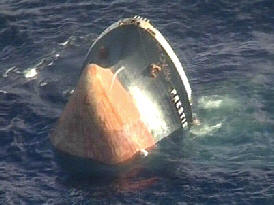|
BRUSSELS, (AFP)
20th Decenber 2002
A month after the Prestige sinking off northwestern
Spain, the European Commission on Friday again
called on EU members to immediately ban from
their ports single-hull tankers carrying heavy fuel
oil. EU Transport Commissioner Loyola de Palacio
challenged the EU member countries to learn from
the past, put considerations of special interests aside,
and adopt substantive measures to prevent environmental
disasters.
"The commission first made this sort of proposal on the day after the Erika sinking, in December 1999," De Palacio said in a statement.
Oil spilled from the Erika soiled some 400 kilometers (250 miles) of French coastline, causing more than 849 million dollars (euros) worth of damage.
Since the Prestige sinking, De Palacio has repeatedly said that the accident could have been avoided if the EU had adopted stringent safety measures after the Erika disaster.
The commission's statement comes a day after EU's justice and interior ministers called for an introduction of criminal sanctions in environmental protection measures.
Shortly after the Prestige oil tanker sank on November 19, the European Commission, along with the Danish EU presidency and the international environmental group Greenpeace, urged the EU to ban similar tankers from its waters.
But while EU transport ministers met in the beginning of December to mull such safety steps, there was little agreement among the 15 member states -- some with sizeable interests in the shipping sector -- on what exactly those measures should be.
The Prestige broke in two and sank after being towed out to sea some 270 kilometers (170 miles) off the Spanish coast.
Since then, it is estimated to have spilled more than 20,000 tonnes of heavy fuel oil, according to latest Spanish government figures.
The sludge has soiled the once-pristine coast and wreaked havoc on the economy of the Galician region, heavily dependent on the fishing and tourism industries.
The commission urged the EU to adopt the ban by March 2003 and also proposed a gradual phase-out, between 2005 and 2010, of single-hull tankers carrying other hydrocarbons.
Top
|
